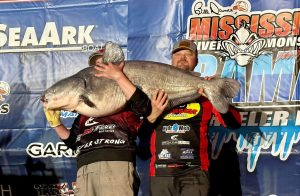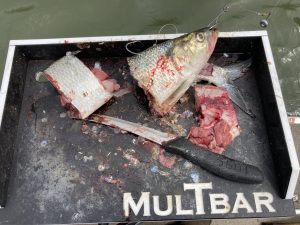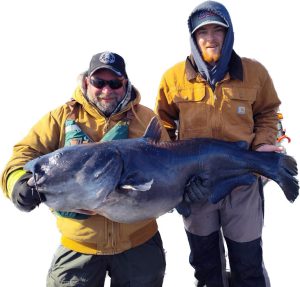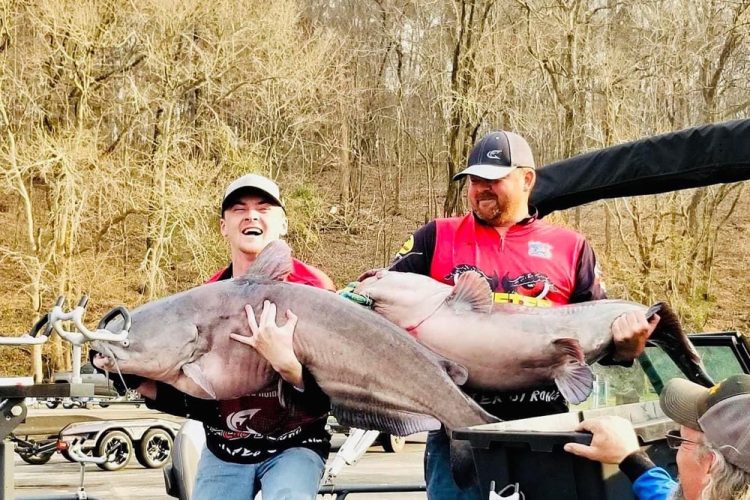Jackson and Mike Mitchell with part of a tournament-winning catch of 3 catfish
weighing 171 pounds on Wilson Lake. Photos courtesy of Mike and Jackson Mitchell
Cattin’ Around the Tennessee River
By Terry Madewell
Becoming a catfishing guide was in Jackson Mitchell’s genetic core as a youngster, He just didn’t know it at first.
Like his father, Mike Mitchell, Jackson’s first fishing passion as a youngster was competing in bass tournaments with his dad, and this fish-pattern learning process taught him much about fishing in general.

Helping with his dad’s catfishing guide service on Tennessee River lakes in northern Alabama jump-started the young Mitchell’s journey into trophy catfishing. These guide trips allowed him to sample the world of catfishing, and his passion, like his father’s before him, became catching trophy catfish and sharing that experience with others.
Mike and Jackson Mitchell, both from Russellville, Alabama, are now full-time guides at SouthernCats Guide Service. They target Guntersville, Wilson, Wheeler, Pickwick, Nickajack and Chickamauga lakes.
The 47-year-old elder Mitchell said it’s not uncommon for both he and his son to be aboard the boat.
“We enjoy catfishing together, and we’ll also fish together when not booked to keep up with fish patterns,” he said. “It’s important during the winter when weather and rain change water conditions and fish patterns quickly. We enjoy these days working out patterns for upcoming trips.”
These two trophy catfishermen both fished bass tournaments early in their fishing life. Mike Mitchell grew up under the tutelage of his dad, and they were primarily focused on tournament bass fishing.
“I started fishing with Dad when I was knee-high to a grasshopper, and we fished bass tournaments competitively. But we fished for other species, too,” Mike said. “I think having this baseline of general fishing knowledge helped me later after I got hooked on catfishing.”
As a youth, Mike Mitchell (256-673-2250) fished jugs and bush lines for catfish but decided to try it with a rod and reel as he got older.
“After I graduated college and got a job, I went to Walmart, bought a “Catfish Special” rig and caught a blue catfish weighing in the high 40-pound class,” he said. “I was immediately over bass fishing as my first fishing love. I realized catching a 10-pound bass was nothing like fighting a 50-pound catfish. That was in 2001, and soon, people were asking me to take them catfishing, and some were offering to pay. That’s how my guide service business began. I started the guide service in 2003 as a part-time effort, and I went full-time in 2020.”

The journey of 21-year-old Jackson Mitchell was remarkably similar. He and Mike fished bass tournaments together and developing those skills laid a foundation of fishing knowledge for the younger Mitchell.
“I enjoyed all types of fishing, but when I started catching big catfish on rods and reels, I got catfishing fever,” he said. “Catching big catfish is more fun than catching big bass. And I could enjoy it while helping Dad with his guide service until I started guiding on my own.”
Jackson Mitchell may only be 21 but already has years of one-on-one big-cat experience. He said fishing the Tennessee River means giant catfish are in play year-round, but prime trophy catfish action is in the colder months.
“Big catfish are more consistently caught from December through April on the lakes we fish,” he said. “Blue catfish are the primary target during the winter, but we occasionally catch big flatheads. April and May are prime months to target trophy flatheads.”
Jackson said all the lakes they fish are productive during winter, but each has diverse water conditions and current patterns.
“Without enough current, the fish scatter, making it difficult to target them in specific places,” he said. “Current is something we want.”
Jackson said they employ drifting or dragging as a primary tactic during the warmer months but favor anchored setups during the winter.

“We target places with the right combination of forage and catfish marked on our electronics,” he said. “That’s a pattern fishing that fishing for other species has taught us, that forage is always a key. How various species utilize forage is different, but find the forage, apply the right tactics for catfish, and you’ll catch trophy catfish.”
The younger Mitchell said current influences catfish habitat preference, and they often prefer to be close to woody structures found on points, humps, ledges and flats. Fish may be relatively shallow, especially on cloudy or rainy days, and in deeper water on bluebird, cold, high-pressure days.
“All depth options can be productive during winter; it’s a daily process of working out the patterns for the conditions we have that day,” he said.
Mike Mitchell said bait is the key to catching trophy catfish, and he strongly prefers using natural bait from the lake he’s fishing in.
“For us, the best overall bait is skipjack, and I want it fresh,” he said. “Fresh bait outfishes frozen bait. Gizzard shad is an excellent bait, and I’d take fresh gizzard shad over frozen skipjack.”
This father-son guide team is passionate about putting clients on trophy catfish or a cooler of eaters.
“The biggest catfish we’ve caught was a 117-pound blue that I caught in January a few years ago,” Mike Mitchell said. “We’ve also had a client catch a triple-digit fish during the winter.”
“We believe in big baits for big fish, but if a client wants a bunch of eater-sized catfish, we downsize our tackle and rigs and fish areas where big numbers of fish gather.”
“After catching big catfish for years, my true love for catfishing has become helping other people experience the thrill of hooking a trophy catfish,” Jackson Mitchell said.
While their fishing passion is focused on giant catfish, it’s founded on multiple generations of family members who loved to fish and shared their fish-catching experiences with them. Mike and Jackson Mitchell remain faithful to this family tradition.
(Terry Madewell of Ridgeway, S.C. has been an outdoor communicator for nearly 50 years. He holds a degree in Wildlife and Fisheries Management and has a long career as a professional wildlife biologist/natural resources manager. He’s passionate about sharing outdoor adventures with others.)



